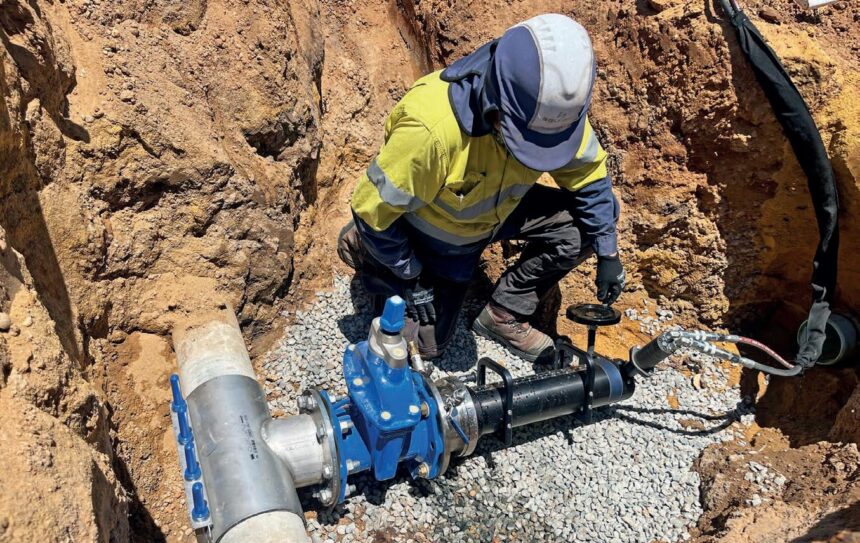Hot tapping — connecting to a pressurised pipeline without shutting it down — is essential for industries like water supply, oil, gas, and industrial processing. It allows operators to perform maintenance, modifications, or expansions without costly service interruptions.
But in many cases, the equipment used for hot tapping has been bulky, heavy, and logistically challenging. For worksites across Australia — where distances can be vast and access points are often in difficult-to-reach locations — a compact, portable solution isn’t just convenient; it’s essential.
The demand for portable hot tapping machines has been steadily growing, both in Australia and worldwide, as contractors and engineers look for faster, safer, and more cost-effective options.
The Problem with Traditional Hot Tapping Machines
Conventional hot tapping machines are often designed for large-scale industrial use. While powerful, they can weigh dozens of kilograms, require significant setup space, and require heavy transport equipment.
In Australia, these challenges are magnified. Transporting heavy hot tapping machinery to remote mining sites, rural infrastructure projects, or inner-city maintenance locations can be expensive and time-consuming.
Urban projects add another layer of difficulty — congested streets, underground utility corridors, and tight plant rooms often leave little room to manoeuvre. The result? Increased labour costs, more complex logistics, and sometimes even project delays while suitable equipment is sourced.
Introducing the Compact Solution
Australian engineers have developed the world’s most compact hot tapping machine, available at MiniTap, which is changing how pipeline maintenance is performed.
MiniTap’s innovation lies not only in reducing size and weight but also in preserving the strength and reliability required for high-pressure hot tapping. This breakthrough combines engineering precision with practical field requirements, delivering a tool that’s as capable as it is convenient.
The development is a homegrown success story — created by Australians, for the demanding conditions of Australian worksites, and now attracting global attention.
Key Benefits for Australian Users
- Easier Transportation Across Vast Distances
In a country where work sites can be hundreds of kilometres apart, portability is critical. MiniTap’s lightweight design allows it to be carried in the back of a ute or even checked as luggage on domestic flights, dramatically cutting down on freight costs and delivery times. - Access to Confined Spaces
From inner-city high-rise basements to underground utility chambers, MiniTap’s compact frame means technicians can perform hot tapping in tight, awkward spaces where traditional machines simply won’t fit. - Reduced Setup Time and Labour Requirements
The simplicity of the design means fewer tools are needed for setup, and the lighter weight means fewer personnel are required to position the equipment. This translates into faster project completion and reduced labour expenses.
Practical Applications
Australian contractors are already putting the world’s smallest hot tapping machine to work in a variety of situations:
- Urban water system upgrades — Local councils can add new connections or bypass lines without disrupting water supply for thousands of residents.
- Mining and resource projects — Remote operations benefit from the reduced freight load and quick deployment on site.
- Oil and gas facilities — Safety and operational continuity are paramount, and compact machines make it easier to work in restricted, hazardous environments.
- Industrial processing plants — Maintenance teams can manoeuvre around crowded machinery layouts without dismantling existing infrastructure.
In each case, the compact design removes barriers that once made hot tapping impractical or excessively costly.
Cost Advantages
The MiniTap solution offers direct financial benefits:
- Lower transportation costs — Without the need for oversized freight or specialised lifting equipment, contractors save on logistics immediately.
- Reduced downtime — Smaller machines can be deployed faster, minimising disruptions and allowing for more flexible scheduling.
- Long-term investment value — Because the machine is versatile enough to handle a range of pipe sizes and materials, contractors can reduce the number of specialised tools they need to purchase or maintain.
For Australian companies competing in tight-margin industries, these cost efficiencies can mean the difference between winning and losing a contract.
Conclusion
Australia’s MiniTap is more than just a smaller hot tapping machine — it’s a complete rethink of how pipeline maintenance can be approached. In a country where challenging distances, diverse climates, and unique infrastructure demands are the norm, its portability, efficiency, and adaptability make it the perfect fit.
By removing the barriers of weight, size, and setup complexity, MiniTap is giving Australian contractors a competitive edge at home and abroad. And as more industries discover the advantages of compact hot tapping technology, this Australian innovation is poised to become the global standard.

